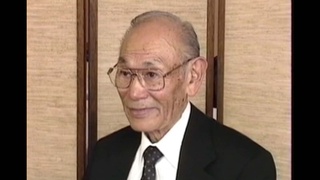Interviews
Institutionalization as a bad aspect of camp
I think the lack of privacy was such a big thing. You couldn’t get away to have any kind of privacy. That does something. It was such a controlled community that way. And when you don’t have your own space, it does something to you, I think. It was a good thing that it did not last much longer, because as one of the fellows said in the testimony before the Commission [on Wartime Relocation and Internment of Civilians], that even if it [the incarceration] was three or four years, people got used to being institutionalized, being taken care of. And it was showing signs of lack of discipline, lack of initiative on the part of people. And especially Issei, who had lost everything, anyway. They had no initiative to go and start life anew and it got harder [as they remained in the camps], so they were so much fearful when it was announced that the camps would close. They were afraid to go out. And this institutionalization was a bad aspect of the camps.
Date: August 26, 1998
Location: Virginia, US
Interviewer: Darcie Iki, Mitchell Maki
Contributed by: Watase Media Arts Center, Japanese American National Museum
Explore More Videos

Choice to move east or go to Japan
(b.1920) Japanese Canadian Nisei. Established the Ikenobo Ikebana Society of Toronto

Remembering December 7, 1941
(1923-2011) Lawyer, MIS veteran, founder of Francis and Sarah Sogi Foundation

Meeting Japanese Americans from the mainland in MIS
(1923-2011) Lawyer, MIS veteran, founder of Francis and Sarah Sogi Foundation

Awareness of concentration camps as a Japanese American
(1923-2011) Lawyer, MIS veteran, founder of Francis and Sarah Sogi Foundation

Manhunt
(1919 - 2005) Challenged the constitutionality of Executive Order 9066.

The Final Verdict
(1919 - 2005) Challenged the constitutionality of Executive Order 9066.


Reaction to a 1942 speech by Mike Masaoka, Japanese American Citizen League's National Secretary
(1915 - 2011) Nisei florist who resettled in New York City after WW II. Active in Japanese American civil rights movement


Reasons for conformity and competitiveness in Gardena, California
(b. 1946) Lawyer

Role of the redress movement in helping Nisei to open up about their wartime experiences
(b. 1946) Lawyer

Search of family home by the FBI following the bombing of Pearl Harbor
(1937 - 2021) Teacher

Not recognizing father after reunion at Crystal City, Texas
(1937 - 2021) Teacher

A child's memories of activities at Crystal City, Texas
(1937 - 2021) Teacher

Hearing about Pearl Harbor
(b. 1921) Nisei veteran who served in the occupation of Japan
